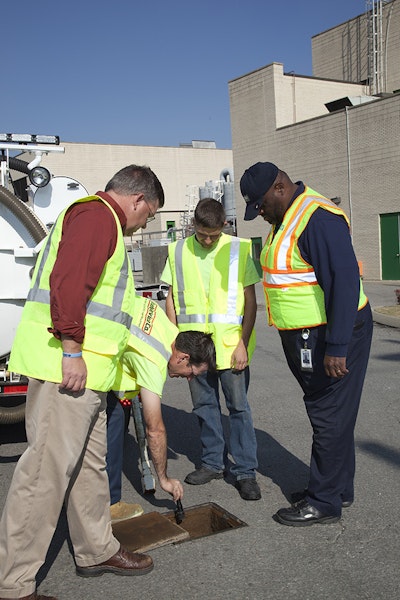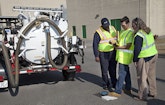Interested in Infrastructure?
Get Infrastructure articles, news and videos right in your inbox! Sign up now.
Infrastructure + Get AlertsHal Balthrop and his team in the Water Distribution and Sewer Collection Division of Metro Water Services like to stay ahead of potential problems in the system serving Nashville and residents of surrounding Davidson County in central Tennessee. The city and county operate under a combined government. MWS also serves portions of two adjoining counties that are part of the Nashville metropolitan area.
Balthrop, the assistant director overseeing the MWS distribution and collection systems, says that tracking the condition of the systems and preventing potential problems has become even more important as the utility relies more and more on outside contractors for a wide array of services once performed in-house.
In recent years Nashville, like many cities, has established hiring freezes to help address funding cuts due to the faltering economy. Those freezes mean that even as the customer base rises and the system grows, Balthrop and his fellow managers at MWS have to make do with smaller staffs as attrition shrinks the workforce.
As a provider of essential services, MWS has had to find ways to continue operating without cutting back on the final outcome. To that end, Balthrop says, they have stepped up their preventative efforts to avoid problems that drain manpower and financial resources while impeding customer service.
"We put emphasis on preventative and predictive actions versus reactive. We try to use the programs we have — like leak detection — to take action before a situation becomes a failure," Balthrop says. "Especially on the water side, it's not effective and it doesn't serve the customer well if we run the system to failure."
Calling on contractors
Metro Water Services has a total of 645 employees, with 154 working under Balthrop in the distribution and collection system. To adapt to the hiring freeze, the division leader says he relies more and more on outside contractors to perform specific programs needed to keep the systems operating at optimal levels.
Balthrop, who has been in his position for 12 years, says the use of contractors for selected programs started before the hiring freeze, but adds that it has been a key to maintaining operations since the fiscal vise began to tighten on city hiring.
"Over time, as we reviewed what our core functions are, we decided ours was treating water and distribution of water," he says. "Beyond those core functions, we found many programs that could be performed by contractors. It has worked for us and we believe we get good value. We think we've been good stewards for our customers."
Services currently under contract include the MWS leak detection program and the city's valve exercise program, an operation that had been overlooked in the past. Mueller Service Co., based in Plant City, Fla., has a contract to locate and exercise all of the approximately 76,000 valves (including 19,000 fire hydrant leads) in the MWS distribution system. While the location of most valves is already accurately recorded in the utility's asset tracking system, Balthrop says Mueller employees are hunting down a number of valves that have been covered, paved over or improperly recorded in the records.
As the contractor's crews locate and exercise the valves, they are recording not only accurate locations for the city's GIS records, but also helpful data for the MWS crews who will need to perform system maintenance and respond to emergencies in the future. The information collected includes the type, size and material of each valve and even the number of turns needed to fully open and close it.
All of the information is fed into a computer maintenance management system from Infor Public Sector/Hansen Technologies. That system is linked to Nashville's GIS software system from Esri. When field technicians in the distribution system prepare to do maintenance or emergency work, they have full access to all of the information before they arrive.
"The more information you have, the better you can do your job," Balthrop says.
In the past, MWS crews sometimes had to go back two or three extra valves to find one that could shut down flow to an area where they needed to perform maintenance or address an emergency. That meant more customers than necessary were losing their water service while the work was under way, something the assistant director says is unacceptable.
MWS managers don't rely only on contractors for vital data to bolster their maintenance program; they stress to their own employees the importance of providing information for the CMMS. "We make sure that the field personnel understand that what they do is important and that the data they record is important. We try to demonstrate how we use the information they provide us; how critical it is for our operation."
Mueller was one of three companies that responded to the Request for Proposals issued by MWS when it decided to contract for the valve exercise program. The contract was awarded on a per-valve basis with a scale based on valve size and access.
In addition to providing better customer service — better water quality and palatability, improved operating pressure and water age reduction — Balthrop says he expects the valve exercise program to enable a better and more dependable use of their hydraulic model and set a baseline for future exercising.
Among the other key services contracted out by the water distribution operation is a leak detection program that Balthrop says is essential in preventing major failures. Water Systems Optimization, an international engineering firm, was awarded a second five-year contract to continue the MWS leak study in 2010. The company, whose office serving the eastern half of the United States is located in Nashville, also has the contract to conduct an annual water audit required by the state.
Balancing needs
A study focusing on what MWS needs to do as it works to optimize the distribution system operation, including availing system-wide fire protection, is also under way. Balthrop says it has been a difficult task to balance the needs for sufficient flow and pressure for fire suppression while minimizing the potential negative impact on residential customers' water quality.
Another key element in the MWS preventive maintenance program is its comprehensive cross-connection control plan that involves the annual inspection and testing of about 25,000 devices and/or locations. The inspections on facilities with 2-inch and larger meter connections are done primarily in-house. Inspections of individual households and some small commercial accounts are done under contract.
The Nashville utility faced one of its greatest tests in 2010 when historic floods on the Cumberland River inundated large areas of the city and forced the shutdown of one of the two water treatment plants operated by MWS. Fortunately, Balthrop says, the utility had designed redundancy into the operating capacities of its plants, and with some conservation measures was able to meet the needs of the customers even while the damaged plant was under repair. And, Balthrop adds, he was particularly pleased with the performance of the distribution system during the flooding. "I am happy and proud to report that we did not have to issue any boil water notices throughout the flood and the flood recovery."
Sticking to the schedule
Generally, Balthrop is pretty satisfied with the condition of the MWS water distribution system, a 2,889-mile network of lines ranging from 60 inches down to 2 1/4 inches. The most challenging areas of the system tend to be in older areas of Nashville, including downtown, where the effective diameter of unlined cast iron water lines can impede delivery of sufficient flow. Those are also the areas where MWS sees the most problems with leaks caused by some of the cold weather that can hit Nashville.
"We track percentages on our work orders — emergency vs. scheduled," Balthrop says. "In terms of water distribution work orders, we are tracking at 98 percent scheduled."
MWS officials lean heavily upon the data collected by field employees and contractors to guide maintenance schedules and long-term planning. Balthrop says those decisions are based on an analysis of varying criteria such as water quality — including water age — materials, break history and available funding.
Available funding is an even more critical factor, not only because of the economic difficulties in recent years, but because of higher priorities in the MWS collection system. After several years of negotiations, Nashville and the EPA have agreed on a plan to alleviate sewer overflows and Balthrop says, "We are under a collection system consent decree so most of our capital over the next 11 years will be spent for compliance."
Looking for the Stars of Tomorrow
Thanks to Washington, D.C., many people are familiar with the term “fiscal cliff.” But Hal Balthrop believes there is a similar dark cloud hanging over his industry, one that he calls the “aging cliff.”
Balthrop is an assistant director of Metro Water Services — Water Distribution and Sewer Collection in Nashville, Tenn. For several years, his operation, like many city departments across the country, has been under a hiring freeze due to the recession. Balthrop has been able to find ways to overcome a shrinking workforce, but he is concerned about the future.
“Twenty years ago, we were all talking about what would happen when the wave of baby boomers began to retire. Now we look around and it’s coming in five years and will continue for several more years.
I am concerned. With the attrition the last few years and the aging workforce, we would all like a little more bench strength to cultivate continuity.
“At a time when we would like to have a supply of young workers learning from experienced workers, we aren’t able to hire them,” Balthrop says. “We’re approaching a very critical time when we’re going to have to start bringing people in and getting them ready.”
The division chief says that new workers may be better prepared to handle the new technology associated with the operation of water distribution and wastewater collection systems, but there is still a lot of practical and local knowledge they can best learn from experienced technicians and supervisors.
Balthrop says the use of outside contractors for many programs has proven beneficial for Metro Water Services but adds that the utility will always need a solid core of staff employees to handle maintenance, emergencies and customer service. That’s why he is anxious for the hiring freeze in Nashville to thaw sooner rather than later, so he can bolster his bench to take lead roles in the future.

















